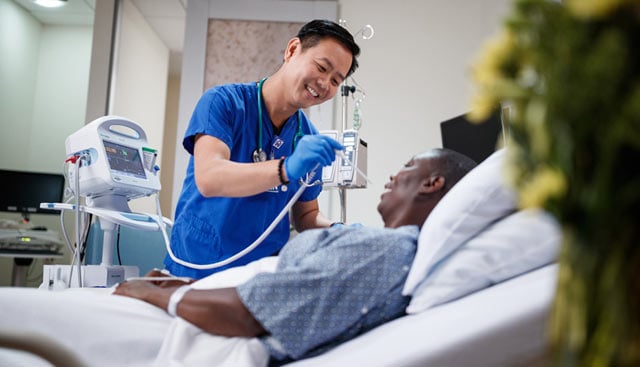Preparing For Your Hospitalization

Whether your admission to Moffitt Cancer Center is planned or unplanned, you are prepared to stay a few days or a few weeks, it is normal to feel anxious and apprehensive about being hospitalized. Knowing what to expect can help alleviate some of your fears.
PREADMISSION
A patient services specialist will contact you to complete the preadmission process. A patient financial coordinator is also available to answer any questions you may have about charges, financial arrangements or insurance coverage. Call 813-745-2868 Monday through Friday from 7 a.m. to 5 p.m. for more information.
What to bring when you are admitted:
- Photo identification such as a driver’s license
- Insurance card
- Pharmacy benefit card
- Payment for your co-payment or deductible with cash, credit card or check
DURING YOUR STAY
Cancer is a highly personal disease, both in the way we treat it and the way our patients battle it. That’s why every room at Moffitt is private. Each room in the hospital offers a quiet, restful, healing place where friends and family can talk openly and candidly, and support their loved one through victories and challenges during treatment. Your nurse will show you how to operate your bed, call light and intercom system, and show you the emergency cord located in your private bath should you need help while in the bathroom.
We encourage you to leave jewelry and other valuables at home; however, if this isn’t possible, talk with your nurse about storing your valuables in the Admitting Office safe. Moffitt is not responsible for any lost or missing personal items such as cell phones, tablets, laptops or jewelry.
Please do not bring electrical items other than hairdryers and electric razors. If you routinely use a medical device at home, you may bring it with you; however, Moffitt reserves the right to substitute another device if it is determined necessary for your care. Be careful with small personal items such as eyeglasses, hearing aids and dentures. Keep them in a case and in the nightstand drawer when they aren’t in use. Please do not wrap your dentures in a tissue or a washcloth or put them on your meal tray where they might be discarded accidentally. Ask your nurse for a denture cup should you need one.
For your safety, we have controlled environments that prevent outside organisms from entering the building. Although state law requires us to have windows that can be opened, it is imperative that windows remain closed at all times.
INTENSIVE CARE UNIT
Our Intensive Care Unit is a patient-and-family-centered unit with 24 beds. Our ICU team provides outstanding quality care and you play an important role in supporting your loved one’s physical, spiritual and emotional recovery. Learn more about our ICU team.
VISITATION AND FAMILY PRESENCE
We recognize the importance of family and visitors in providing comfort and support during your hospital stay. Visitation is supported without regard to age, race, ethnicity, religion, culture, language, physical or mental disability, socioeconomic status, sex, sexual orientation, or gender identity or expression. You decide whom you consider "family," as they can be related in any way — biologically, legally or emotionally.
Interested in bringing a pet? Learn more about Moffitt's guidelines regarding service animals and personal pet visitation.
VIDEOS
The videos provided here will give you important information about what to expect during your stay with us. Some of the topics covered in these videos include:
- Moffitt’s visitation policy
- Items to pack
- Wireless access in the hospital
- Your nursing care team
- Safety precautions
- Controlling your pain
- Features of your room
- Team members available to help
View these helpful videos:
Preparing for Your Hospitalization
Packing for the Hospital
What to Expect During Your Hospitalization
Orientation to the Room and Unit
The Intensive Care Unit
Preparing for Your Discharge
Helpful links:
Preparing For Your Hospitalization

